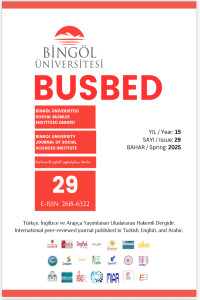ÇALIŞANLARIN PATERNALİST LİDERLİK ALGILARI İE PSİKOLOJİK SAHİPLENMENİN DEMOGRAFİK FAKTÖRLER AÇISINDAN DEĞERLENDİRİLMESİ: BANKACILIK SEKTÖRÜNDE BİR ARAŞTIRMA
EVALUATION OF EMPLOYEES' PERCEPTIONS OF PATERNALIST LEADERSHIP AND PSYCHOLOGICAL OWNERSHIP IN TERMS OF DEMOGRAPHIC FACTORS: A RESEARCH IN THE BANKING SECTOR
Author(s): Mehmet Sadık ÇOBAN, Abdulkadir GümüşSubject(s): Business Economy / Management, Human Resources in Economy, Socio-Economic Research
Published by: Bingöl Üniversitesi Sosyal Bilimler Enstitüsü
Keywords: Psychological Ownership; Paternalistic Leadership; Deposit Banking; Participation Banking;
Summary/Abstract: This research aims to reveal whether bank employees' paternalistic leadership perceptions and feelings of psychological ownership differ according to demographic factors. In line with the purpose of the study, 436 people working outside the title of manager in deposit banks and participation banks in the TRB2 region constitute the sample of the study. The data in the study were obtained by questionnaire method. The questionnaire consists of three parts. The first part consists of demographic factors, the second part consists of statements about the participants' perceptions of paternalistic leadership, and the last part consists of statements about the participants' psychological ownership. The data obtained was analyzed through the SPSS 24 and AMOS 24 package programs. In the study, factor analysis, reliability analysis, normality test and difference analyzes (T Test, ANOVA) were conducted. According to the analysis results, while employees' perceptions of paternalistic leadership differed according to gender and marital status variables, no significant difference was found in terms of age, educational status, total service period and job title variables. In addition, the type of activity of banks has a significant effect on employees' perceptions of moral leadership and authoritarianism, which are paternalistic leadership subdimensions. Similarly, a significant difference was detected between employees' perceptions of moral leadership and authoritarian leadership and the type of bank activity. On the contrary, it has been determined that the regionalism dimension and the belonging and self-identity dimension create a significant difference with educational status. Similarly, a significant difference was detected between the belonging and self-identity dimensions and the job titles of the employees.
Journal: Bingöl Üniversitesi Sosyal Bilimler Enstitüsü Dergisi (BUSBED)
- Issue Year: 15/2025
- Issue No: 29
- Page Range: 1-19
- Page Count: 19
- Language: Turkish

